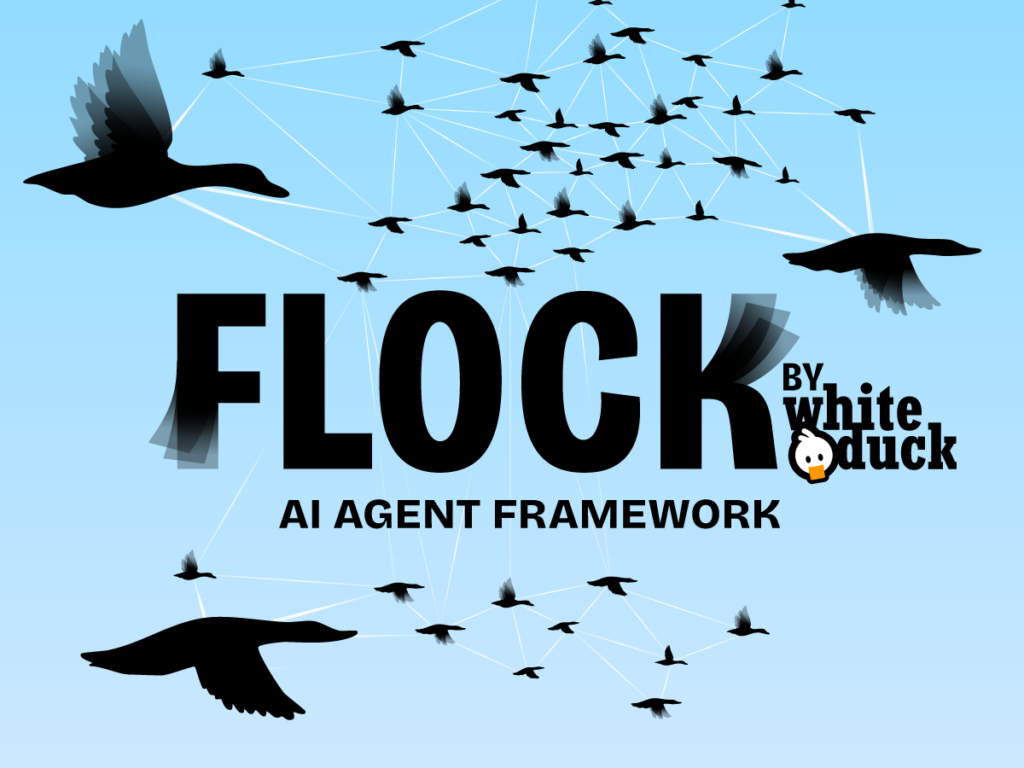Flock – Our new open-source AI Agent Framework
Flock is a framework for orchestrating LLM-powered agents. It leverages a declarative approach where you simply specify what each agent needs as input and what it produces as output—without having to write lengthy, brittle prompts. Under the hood, Flock transforms these declarations into robust workflows, using cutting-edge components such as Temporal and DSPy to handle fault tolerance, state management, and error recovery.
We chose „Flock“ (English for „a group of birds“) because it beautifully encapsulates the essence of AI agent orchestration, much like how a group of birds seamlessly collaborates in flight. We decided on ducks because we love them and they perfectly symbolize the unity and coordination we aim to achieve.

Contents
- Why we built Flock
- A Different Approach: Declarative AI Agents
- The Power of Callables
- Platform out of the box
- Get started & join the flock!
Why we built Flock
We embarked on Flock’s journey some time ago, driven by the need for a more capable and flexible AI agent framework. Existing solutions on the market did not fully meet our requirements for comprehensive AI agent development. Faced with these constraints, we decided to build something new that aligns perfectly with our aspirations. Today, while other AI agent frameworks are evolving, we still see room for improvement.
| Traditional AI Agent Frameworks 🙃 | Flock 🐤🐧🐓🦆 |
|---|---|
| 🤖 Complex Prompt Engineering | 📝 Declarative AI Agent Definitions |
| • Lengthy, brittle prompts | • Clear, concise input/output declarations |
| • Hard-to-tune and adapt | • No need for manual prompt engineering |
| 💥 Fragile Execution | ⚡ Robust & Scalable |
| • Single failure can break the system | • Fault-tolerant with built-in retries and error handling |
| • Difficult to monitor and recover | • Automatic recovery via Temporal workflow integration |
| 🏗️ Rigid Workflows | 🔄 Flexible Orchestration |
| • Limited adaptability | • Dynamic agent chaining and hand-offs |
| • Hard to scale and parallelize | • Modular, concurrent, and batch processing |
A Different Approach: Declarative AI Agents
Flock takes a fundamentally different approach. Instead of fighting against the non-deterministic nature of LLMs, we’ve built a framework that embraces it while providing the engineering guardrails necessary for production systems.
At the core of Flock is the FlockAgent, a declarative base class that represents a radical departure from traditional prompt-based or state machine-based approaches:
agent = FlockAgent(
name="content_analyzer",
input="url: str | The webpage to analyze",
output="title: str, headings: list[str], type: Literal['news', 'blog']",
tools=[web_content_scraper],
use_cache=True
)This declarative approach provides several immediate benefits:
- Automatic Caching: Expensive operations (like web scraping) can be cached automatically
- Type Safety: By leveraging Python’s type hints and Pydantic, we get automatic validation at system boundaries
- Clear Contracts: Input and output specifications serve both as documentation and runtime constraints
- Tool Integration: External capabilities can be cleanly integrated without breaking the AI agent paradigm
The Power of Callables
One of Flock’s key innovations is making almost every aspect of an agent configurable through callables. From the implementation:
class FlockAgent(BaseModel, ABC):
description: str | Callable[..., str] = Field(
"", description="A human-readable description of the agent."
)
input: str | Callable[..., str] | None = Field(
None,
description="A comma-separated list of input keys..."
)
output: str | Callable[..., str] | None = Field(
None,
description="A comma-separated list of output keys..."
)This isn’t just flexibility for flexibility’s sake. It enables:
- Dynamic runtime adaptation based on context
- Clean handling of edge cases
- Complex logic that remains testable
- Clear separation of concerns
Platform out of the box
Looking at Flock’s implementation reveals a serious commitment to providing a complete platform for managing agents:
Lifecycle Management
Each agent has clear lifecycle hooks for initialization, evaluation, termination, and error handling. This makes it easy to manage resources, implement logging, and handle failures gracefully:
async def run(self, inputs: dict[str, Any]) -> dict[str, Any]:
try:
await self.initialize(inputs)
result = await self.evaluate(inputs)
await self.terminate(inputs, result)
return result
except Exception as run_error:
await self.on_error(run_error, inputs)
raiseObservability
Built-in OpenTelemetry integration provides production-grade observability out of the box:
with tracer.start_as_current_span("agent.evaluate") as span:
span.set_attribute("agent.name", self.name)
span.set_attribute("inputs", str(inputs))Temporal Support
Flock includes native support for Temporal workflows enabling robust distributed execution:
async def run_temporal(self, inputs: dict[str, Any]) -> dict[str, Any]:
client = await Client.connect("localhost:7233", namespace="default")
agent_data = self.to_dict()
return await run_activity(
client,
self.name,
run_flock_agent_activity,
{"agent_data": agent_data, "inputs": inputs_data},
)Serialization
Robust serialization support ensures agents can be safely persisted and transmitted:
def to_dict(self) -> dict[str, Any]:
def convert_callable(obj: Any) -> Any:
if callable(obj) and not isinstance(obj, type):
return cloudpickle.dumps(obj).hex()
# ... recursive handling of complex structuresGet started & join the flock!
Getting started with Flock is easy! Visit our GitHub Repository for detailed setup instructions, quick start guides, and a variety of examples for different use cases. Whether you’re new to AI agents or an experienced pro, our resources will help you build, run, and manage your AI agents effortlessly.
Join the flock and be part of something special! We created this project out of a passion for making AI agent development accessible and effective for all. As an open-source initiative, Flock embodies our belief in collaboration and community-driven progress. We invite you to contribute, offer feedback, and share your ideas. Your input can help shape the future of Flock. While we’re still in the early stages of development, we have exciting plans. The possibilities are endless, and the future is bright. Come, be a part of our growing community, and help us take Flock to new heights!